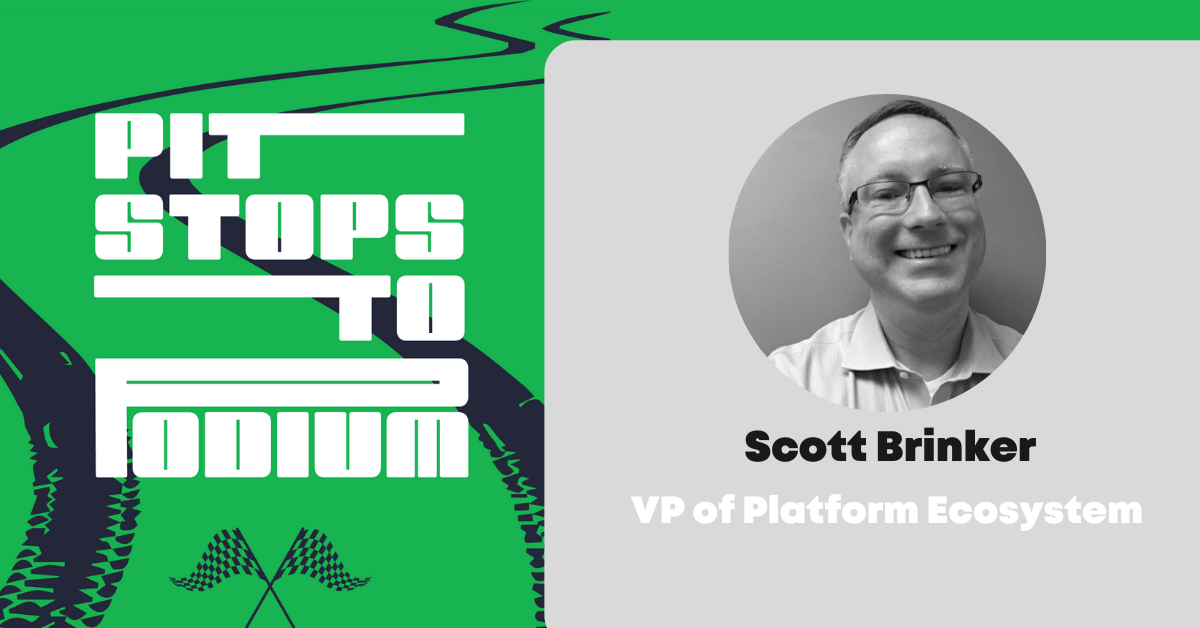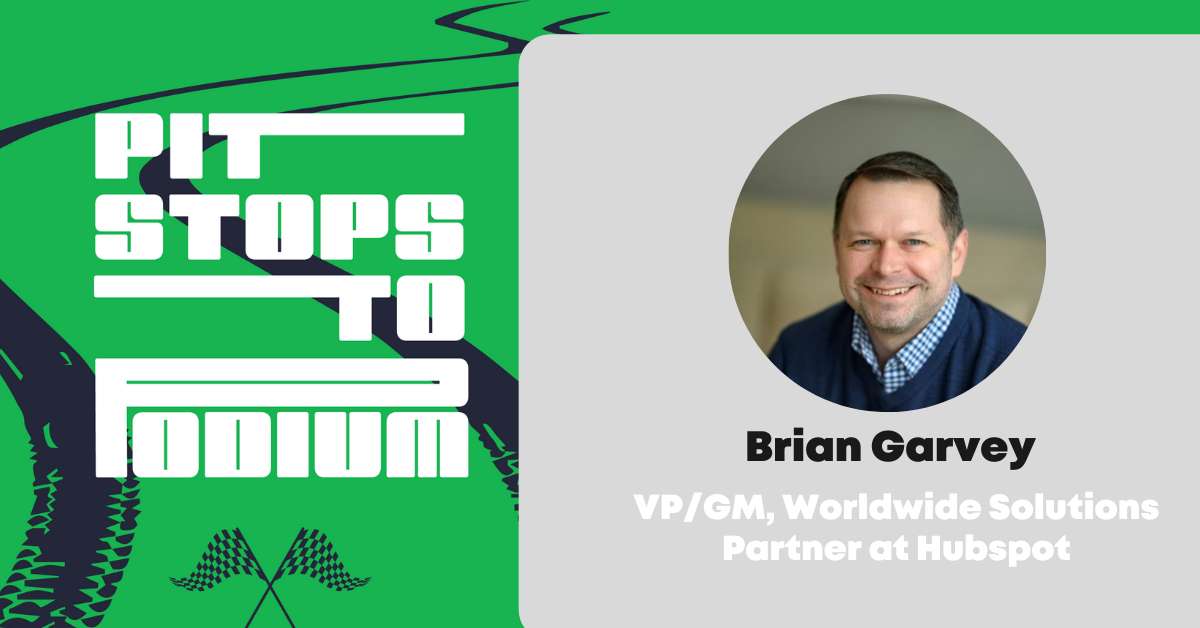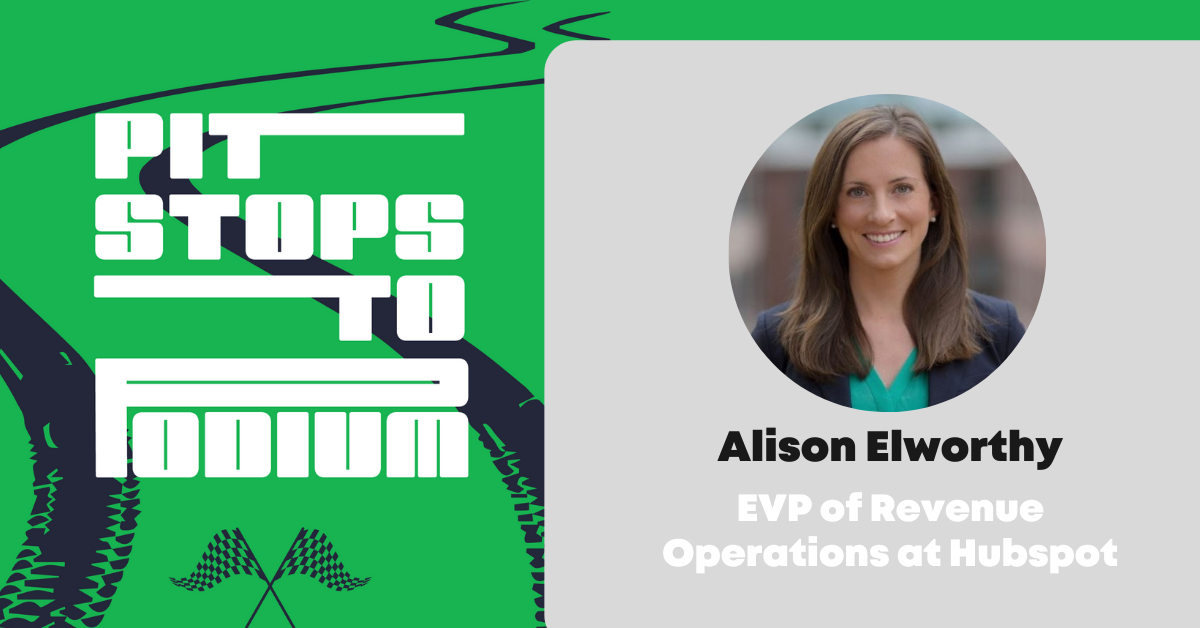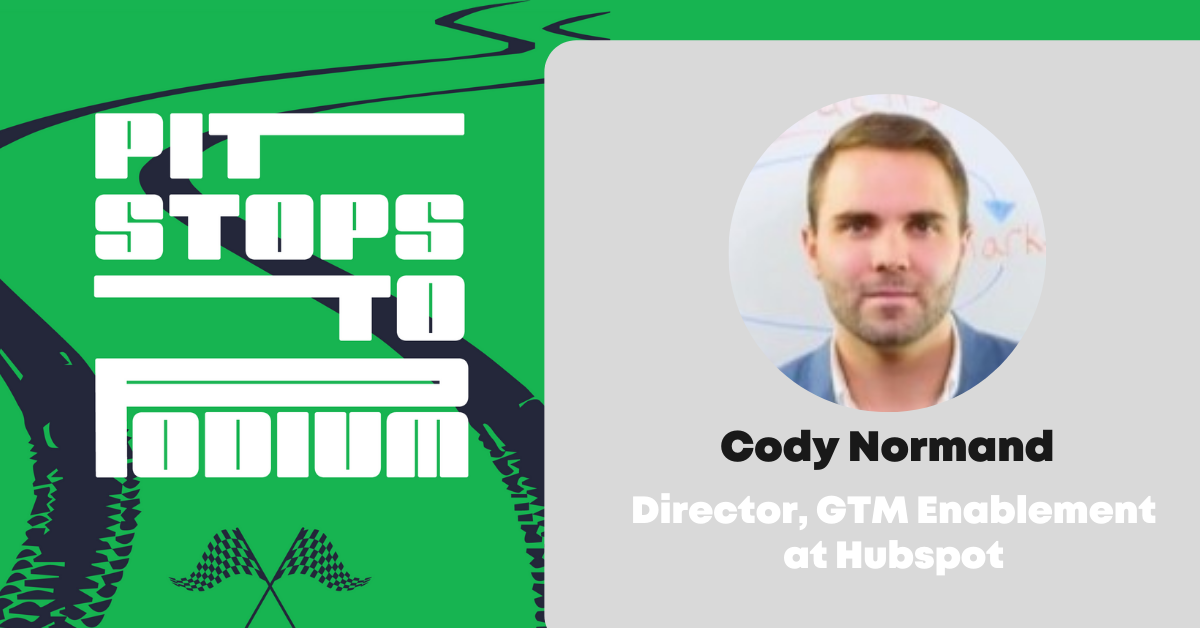Table of Contents
In Episode 28 of the B2B podcast, Pit Stops to Podium, Scott Brinker, VP of Platform Ecosystem at Hubspot, shares his take on how ecosystems support the flywheel at Hubspot, diving deep into the drivers of the ecosystem approach, the tension of innovation and integration, and the long tail of opportunity and potential for ecosystems at big companies. Listen to hear more on how ecosystems are integral to the implementation of the flywheel and the range of opportunities these ecosystems may have on the future of corporations.
Scott Brinker currently serves as the VP of Platform Ecosystem at Hubspot and Editor at chiefmartec.com. As a VP of Platform Ecosystem at Hubspot, Scott shapes the company’s platform strategy and leads business programs for its global technology partner ecosystem. Previously, Scott was the co-founder and CTO of Ion Interactive, a SaaS company that pioneered interactive content for global enterprises (Cisco, Dell, DHL, General Mills, and Microsoft). Since 2008, he has run the blog, chiefmartec.com, with over 50,000 readers, analyzing topics at the intersection of marketing, technology, and management.
Take 20 minutes to listen and then head back to the races! 🏁🏆
Pitstop Highlights
The Drivers Behind the Ecosystem Approach
The drivers that fuel the ecosystem approach are simple: supply and demand. In terms of the supply side, the ability to create software in the cloud is easier than many people think: there are almost no barriers to entry. If you have an idea, you can get that idea built and into the market in a substantially quick time.
Looking towards the demand side, demand is growing stronger because, in Scott’s words, “every single digital business out there is still a little bit of a snowflake.” Essentially, companies are always looking for things that work best for them in their own market, with their own audience. This gives many start-up businesses the opportunity to further innovate and change the basis of their competition.
Innovation Vs. Intergration of Tools
There's a desire for innovation among marketers who often want the best product for their specific needs. But this often creates an integration issue that arises, creating what we may refer to as a “data conundrum”, where tension exists between balancing innovation and the integration of tools. So, how do we solve this type of issue?
Mark believes this issue can be easily fixed. Simply put, the leading platforms of these marketing technology stacks need to have the right APIs, open extensibility, and the right structures to be able to certify and manage quality inventory. Developers also need to make sure they are integrating the right platforms that are relevant to their customers.
The Growth in Opportunity for the Smaller Company Ecosystem
While it's important to recognize the multibillion-dollar tech companies that are paving the way for ecosystems in the marketing tech landscape, Scott emphasizes the focus on markets in the “long-tail” with 10 to 100 million dollar revenues who have substantial potential for growth in ecosystems.
“What excites me about ecosystems is that entire spectrum from both ends. The huge, hundred billion dollar public companies down to the two developers in the garage. There are just so many opportunities for them.”
Connect with Scott:
- Connect on Linkedin: https://www.linkedin.com/in/sjbrinker/
- Follow on Twitter: @chiefmartec
- Check out the App Marketplace at Hubspot: https://ecosystem.hubspot.com/marketplace/apps
Full Transcript:
Brendan: Welcome to Pit Stops of Podium, the RevPartners podcast, where we talk to execs who are competing and won, taking their companies from high growth to high scale. My name is Brendan Tolleson, the co-founder and CEO of RevPartners, and I'm delighted to have with you today, Scott Brinker, for this edition of Pit Stops to Podium. Welcome, Scott.
Scott: Hey, Thanks for having me. Great to be here.
Brendan: Yeah, we're thrilled to have you, Scott. And so just so everyone knows who Scott is, Scott is his title at HubSpot is a VP of platform ecosystem and really all in my mind. Scott, correct? If I'm wrong, that's a fancy word for saying you really own the marketplace at HubSpot. Is that correct?
Scott: Certainly around technology partnerships.
Brendan: Yes great. And then, Scott, you also have a kind of a side hustle, if you will.
Scott: Oh, that's the right word for it.
Brendan: But you're currently the editor at chief martech, correct?
Scott: Yes a passion project. As soon as I get done with all my work in marketing tech during my day job, I come at home and I immediately like to launch into like more marketing technology.
Brendan: So yes, you're like you're a glutton for punishment or pleasure, depending on who you're talking to. Well, Scott, before we get into our big idea and it's kind of right in your wheelhouse, but we have a tradition here at pit stops podium and that's to get to know our guests outside of work. So what are three fun facts that our audience should know about you?
Scott: Wow all right. Let's see. I started my career writing multiplayer games as a while, early, early years of online. And then the second fun fact related to that I actually dropped out of college when I was in college the first time around because of that. Then years later went back to Columbia University, is a nontraditional student to finish my degree. So that was a fun adventure. And then, yeah, the third thing is actually all that stuff I got into on software was really just kind of a diversion. My original career plan was as a music engineer and music producer, but somehow I haven't quite gotten into that one yet. But, you know, there's still time to circle back with me.
Brendan: So are you still a gamer? Do you play at all?
Scott: Oh, far less than, yeah, once upon a time now, now martech is my game.
Brendan: That's great. Well, let's get this transition into the big idea today, which is how a partner ecosystem or really just an ecosystem in general supports the flywheel. And so let's start by talking about what are the drivers and the needs behind this concept of moving into a platform type of approach.
Scott: Yeah, it is such a fascinating space, so pretty much anyone involved in marketing these days, you know, is aware of this incredible explosion of marketing technology that happened here over this past 10 years. In fact, again, one of the things I kind of did with my chief martech, you know, passion project there was over the years I've actually charted on a graph, you know, layout of all these different solutions. And, you know, it went from around 150 10 years ago to like over 8000, you know, as of last year. And this isn't unique to just marketing. I mean, we're now seeing the same dynamic elsewhere in SaaS, too, but certainly marketing. Yeah, it's been extremely clear and it's been fascinating in the sense that the drivers behind this are both supply and demand. I mean, supply side, the ability to create software in the cloud. There are almost no barriers to entry. Now I mean, like, you know, you can leverage, you know, all this super cheap, you know, pay as you go infrastructure from us and Google and azure, you've got all these incredible frameworks and open source. I mean, like you can really, if you have an idea, you can get something built, you know, into market, you know, pretty quickly and pretty easily. And a lot of people do right. But on the other end, it only ultimately only matters if there's demand, you know, to actually take advantage of these things. And what's fascinating is that's been so strong over this time frame, too. And I think the reason why is because even though there are certain set of universal capabilities that most marketing organizations are more broadly revenue organizations, you need to support, you know, digital business. Every single digital business out there is still a little bit of a snowflake, you know, and they're always looking for the specific thing that you know, really works best for them in their market with their audience, or when there's some sort of new technological innovation, maybe a new social media channel, maybe some sort of, you know, new format of how we engage with people. Marketers are, you know, driven by the opportunities to say, oh, let's get ahead of any of what our competitors might do. And so it's been this fascinating thing of between the supply and demand. Yeah, this engine of incredible innovation within the tech landscape, Yeah. Has gotten us to a place where, yeah, I don't know. It's not quite the same as like the App Store for, you know, iPhone or android, but in a B2B sense, it's pretty much up there.
Brendan: Yeah, and it creates there's this tension. You know, we would talk about is, you know, there's a desire for innovation like just talked about what these marketers want the best of the best product for their specific need. But then it creates an integration issue when you have this proliferation of tools. There's really a data conundrum. So let's talk about that in terms of that tension that exists between balancing innovation, but also the integration of the tools.
Scott: Yeah, and that's a really excellent point. It? this was the big challenge of this explosion of the martech landscape over the past 10 years is, yes, there was all this incredible innovation and competition and all these things that we should love, you know? But the problem was each of these things kind of got built in its own little world. And it was really falling on the shoulders of the marketer to figure out, Ah, well, how do I stitch all this stuff together? And for all the things that marketers should be responsible for, you know, stitching together software is probably not one of the top 10. You know, and so this is why you've seen, even over the years, you know, every time people would survey marketers about how marketing, technology, what is the single biggest barrier for you? The answer would almost universally be like integration, you know, everything else like we could figure out, but integration? Come on, man. Throw us a bone. You know, and so this is, you know, the reason why I joined HubSpot was, I think this is something that can be solved. You know, I don't think it's rocket science. I think, you know, the leading platforms that sort of serve as the tentpoles, you know, of these marketing technology stacks or again, more broadly like revenue technology stacks. You know, we need to have the right open APIs and the right open extensibility. We need to have the structures around things like marketplaces to be able to certify and manage, you know, quality inventory that's available to marketers. The developers of these apps need to make sure that they are integrating to the platforms that are relevant to their customers. And if we do our work on those two sides together, then increasingly marketers will be at a place where they can just kind of pull these things off the shelf and whatever decision logic they're using to decide, oh, I want this versus this other one. The integration element of it, you know, becomes sort of like an underlying truth that works across all of them. Because, yeah, I mean, you mentioned the thing about data, it's um, listen, there's all sorts of wonderful innovation and things we can do that are specialized that might live outside of the context of a core platform. But at the end of the day, if we can't bring that data all back into a common system of record, you know, so that we're able to really take advantage of it across the whole firm, across the entire lifecycle of the customer. Yeah, having that stuff out in an isolated, isolated little silo, yeah, just really limits the value that we can get out of it.
Brendan: Yeah well, it speaks to the, you know, messaging like if you want to be a CRM platform for scaling companies, then you need to have that concept of as company scale that you have the integrations that these marketers or sales or revenue leaders, whatever you want to call it, have access to. Because a company has a certain threshold. At one point, it's going to have different needs that continues to grow. So having that flexibility is integral into that journey. Well, Scott, let's transition to another idea, which is really real. We talked about in that last point, you talked about the primary, but there's also know tremendous opportunity for those developers that you described in the garage that long tail. So what does that look like in terms of balancing those integrations with some of those big players, but also creating the space and freedom for some of these smaller up and coming innovative type companies to support companies?
Scott: Yeah, you know, that's one of the things that I feel like I've been beating on this drum for a while where, you know, every time I would publish that crazy martech landscape with all these solutions, you know, again, I appreciate why marketers the integration challenge has to be solved for them to feel joy and not frustration with that, you know? But one of the pushbacks was like, oh, no, no, no, this is too many things like this. Just all should consolidate down into one or two or three companies, you know, and part of the fallacy there is this assumption that, Oh well, the only software companies that matter are somehow those that consolidate into these huge, you know, Tens of billions, hundreds of billion public companies. But that's just not true. I mean, don't get me wrong, we are seeing, you know, that sort of consolidation at the head, you know, of the martech tail. And that's fantastic. Those are the companies that are the tent pole platforms, you know, around which these ecosystems grow. But as you go down that long tail, I mean, there are just so many markets and you know, some of those markets are $100 million. Some of them are $10 million. Some of them are this sort of niche thing that serves a particular kind of business and a particular region doing a particular, you know, serving a particular audience and a particular industry. And maybe for like the two developers who develop that particular niche solution like, oh, well, you know, their business is only going to be worth, you know, a million or $2 million in revenue a year. But actually, if it's a couple of developers who have done that and they've got the best piece for that out there and they're each making a million bucks, it's that a successful software company. I would say, yes, that's. You don't have to be like, you know, HubSpot Adobe, so you don't have to be at that level to say, like, wow, we delivered value to customers. We made a great living doing this. And what excites me about ecosystems is that entire spectrum from both ends, you know, the huge $100 billion dollar, you know, public companies down to the two developers in the garage. It's just so many opportunities for them.
Brendan: I love the way you describe it. You mentioned the area and the opportunity it becomes and there's a communal aspect of it as well where you have all these different relationships and ultimately deliver value to different stakeholders, and it's beautiful to see that work in motion. Well, Scott, I really enjoyed learning more about this space. Your passion is evident. What are some practical ways that if our audience wanted to connect with you with Hubspot, what are some ways that you'd recommend?
Scott: Sure well, I am at chief martech without the H at the end on Twitter, so always happy to engage there. My email at HubSpot is esperanca at HubSpot. So if you have questions about the ecosystem as a developer or as a potential customer? Happy to answer them. Yeah and if you want, go check out the app marketplace for HubSpot and take a look at what that long tail of innovations people are creating. It's some pretty cool stuff.
Brendan: All right, Scott. Well, thank you for stopping by. We do appreciate your time and your expertise. We'll be in touch soon.
Scott: Sounds great. Thanks for having me.
Want to learn more form industry experts?
Come check out the full Pit Stops to Podium podcast repository!




